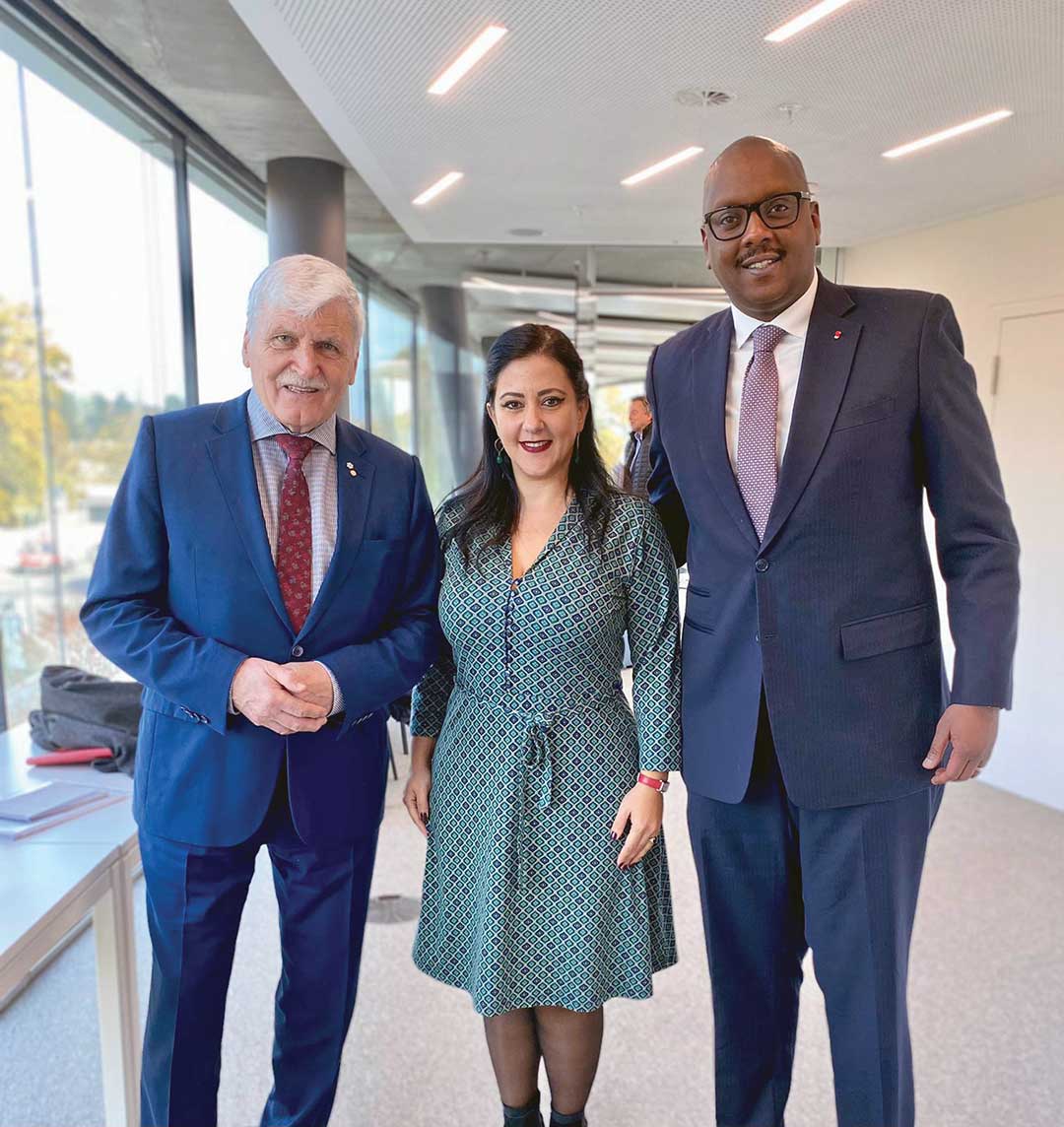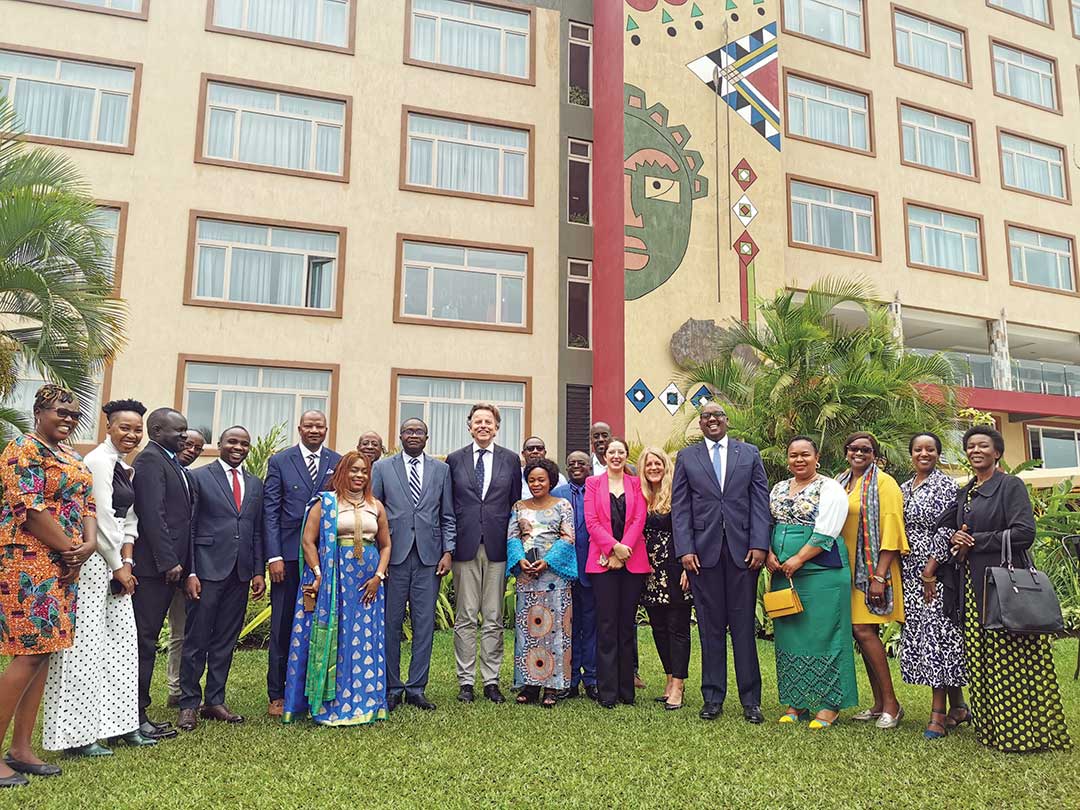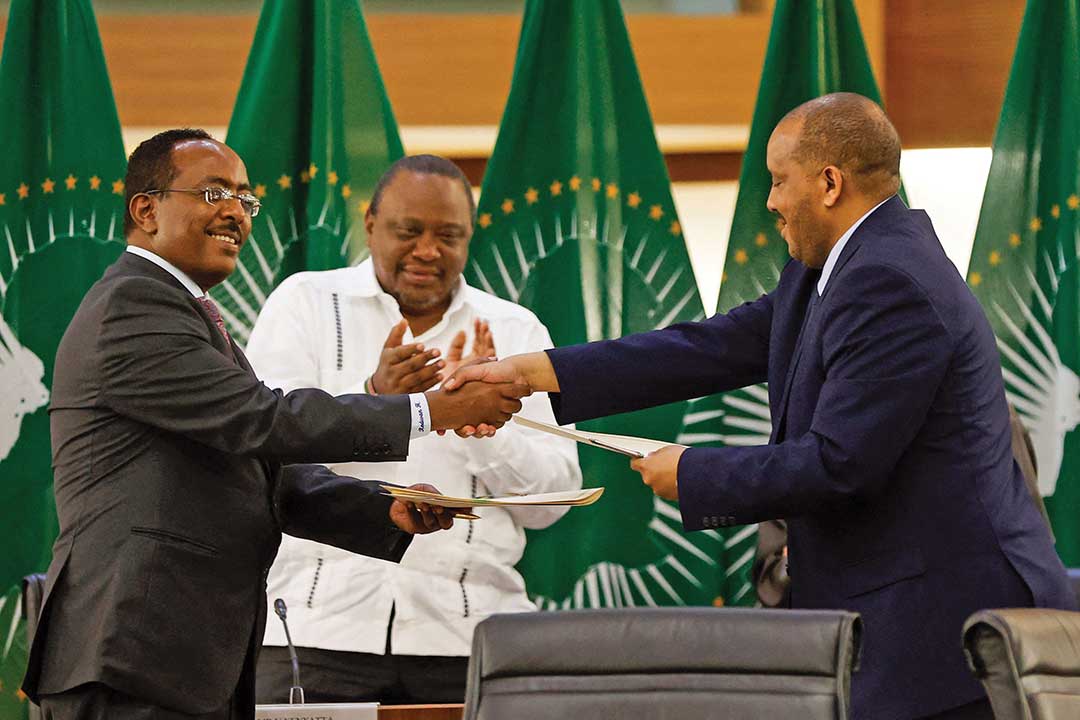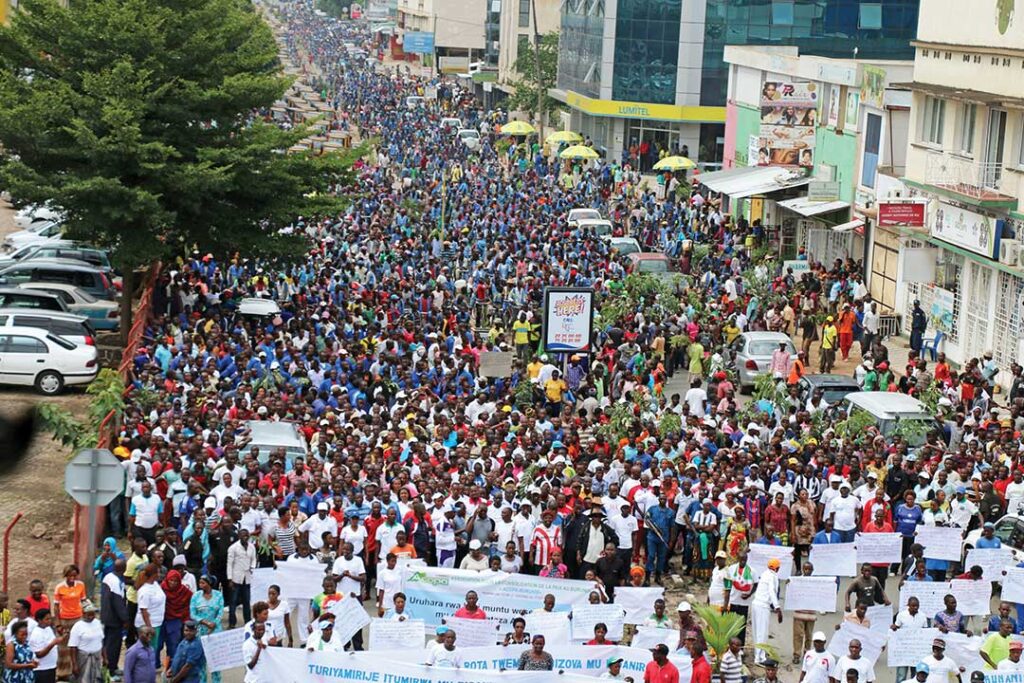ADF STAFF
In returning to his hometown of Bujumbura, Frederic Gateretse-Ngoga awoke every morning with a strong sense of place and purpose.
It was November 2022, and he was back in Burundi’s capital amid the familiar colors, smells, hustle and commotion to host a regional dialogue of people gathered to advance a new approach to conflict resolution called the Principles for Peace (P4P).
A mere 15 kilometers away, the eastern reaches of the Democratic Republic of the Congo (DRC) loomed — a blood-soaked battleground awash with multiple armies, rebel groups, extremist militants, scores of armed militias, and millions of civilians crying out for peace and protection.
“Every morning when you wake up in Bujumbura you see the mountains of eastern DRC,” Gateretse-Ngoga told ADF.
Burundi’s own violent history weighed on his mind as well.
The son of a diplomat, Gateretse-Ngoga saw his adolescence and young adulthood marked by genocide, civil war, coups d’état and countless deaths. Among them were two of his young cousins.
“Their deaths marked me greatly,” he said. “I realized that there was not a single family in Burundi that had not been affected by the cycles of violence.”
Those events and losses forged his future as a peacemaker.
The African Union’s Senior Advisor for International Partnerships, he also has led the Early Warning and Conflict Prevention Division in the AU Peace and Security Department and served as a senior officer for the AU peacekeeping mission in Somalia.
Today, as a member of the P4P’s International Commission for Inclusive Peace, Gateretse-Ngoga is working to make the P4P and its Peacemaking Covenant the standard for peacemaking principles. It’s a lodestar that mediators, governments, and regional and international bodies can use to chart a course to sustainable peace before, during and after conflict.
The meeting in Bujumbura was one of hundreds of engagements over two years that shaped the Principles.
With the Itombwe Mountains in the background, a conference room full of veteran peacemakers, activists, survivors and unflinching optimists wrestled with the region’s violent past and present, seeking to make sense of the ripples between.

Old Challenges, New Principles
The list of conflicts in Africa is long. More than 30 conflicts are affecting hundreds of millions of people across the continent. Some are state based; some are communal. All are devastating to societies and communities, costing lives, economic prospects and social cohesion.
Completed in January 2023, the Principles offer a concrete road map and follow-up mechanisms that its organizers believe will mesh with efforts by governments, regional authorities and international bodies.
P4P Foundation Executive Director Hiba Qasas, who is from the Palestinian territories, says her organization aims to build a movement to revolutionize peacemaking.
“Growing up in a conflict zone deeply influenced my path,” she told ADF. “I have witnessed the stark realities of loss and suffering firsthand.”
The Principles, she said, are bringing the concept of social peace to peacemaking to build “an environment free from conflict and insecurity, with justice and freedom of expression respected, with rights protected.”
The peacemaking and stabilization space previously lacked a common set of standards, she said, noting the impact of the Red Cross’ humanitarian principles, some of which were adopted by the United Nations in 1991.
“It is like the Wild West,” Qasas said. “This absence has resulted in various actors engaging in peacebuilding using different approaches, starting from different assumptions, and measuring success differently.”
When warring parties agree to a cease-fire or to end a dispute, there is significant risk of a return to conflict. Almost half of global conflicts since 1989 have recurred, some as many as three times. More than 2 billion people live in conflict-affected and fragile states, suffering the direct and indirect consequences of violence and insecurity.
“There are major gaps in the current peacemaking approach, and these were a significant motivating factor in the creation of the P4P Foundation,” Qasas said. “Too often peace fails when it is not sufficiently legitimate, inclusive or transformative.”

Three core principles of the organization’s Peace Covenant are dignity, solidarity and humility. They address the need to root peacemaking efforts morally and ethically to promote trust and respect.
The next two principles — enhancing legitimacy and accountable security — serve as a foundation for reaching lasting peace.
Three final principles underscore the commitments needed to strengthen peacemaking: promoting pluralism; adopting subsidiarity, which states that issues should be dealt with at the most local level; and advocating integrated and hybrid solutions.
“It is crucial to recognize that achieving political peace is not enough,” Qasas said. “Peacemaking should be viewed as a broader effort to transform state-society relations.
“It should improve the responsiveness and accountability of governance mechanisms, provide real benefits to communities, and address underlying social fractures.”
The Principles for Peace provide these standards as a practical guide and an accountability tool. They are meant to serve as a framework for creating and implementing peace agreements while addressing the key drivers of conflict in a more inclusive process.
The Principles were the product of 700 case studies and 150 consultations in more than 60 countries, in which P4P engaged with thousands of stakeholders from around the world at grassroots and state levels to learn from experiences and listen to those most affected by conflict.
Qasas described a process in which she and other organizational leaders held dialogues with peaceful actors and nonstate armed actors. They spoke with spoilers, who are members of groups that are excluded from a peace process or who exclude themselves and use violence to attack the process.

“In some cases when you talk to different constituencies they say, ‘We were not part of the process,’” she said in Bujumbura. “Peace is done to us, it’s not done with us, and we don’t necessarily own it.”
Desiré Yamuremye, a Jesuit priest who was a member of the Truth and Reconciliation Commission in Burundi, spoke during the Bujumbura meeting and said most peace agreements made in the wake of conflicts do not reflect realities on the ground. They do not consider the economic damage and psychological trauma of the people.
“For a conflict to be transformed into full peace, there must be economic progress that is seen to be open to all,” Yamuremye said. “Social peace is more important than a politically negotiated settlement.
“The absence of war does not necessarily mean peace.”
‘Give it legs’
The Principles for Peace have five state sponsors — Denmark, Germany, the Netherlands, Sweden and Switzerland — and more than 100 nongovernmental organizations support it.
In May 2023, the Principles for Peace were recognized as an important shared frame of reference and common standards among peacebuilding actors at the U.N. Security Council High-Level Open Debate.
The Principles were launched on July 10, 2023, in the Philippines, where they are serving as an accountability tool to track further implementation of the Bangsamoro peace process.
In Africa, the organization held exchanges with the AU, the East African Community regional bloc and leaders in Somalia, who are drafting plans to launch a Principles for Peace initiative there.
Qasas is excited and ambitious about this phase of deploying the Principles. She said she is determined for this work to “not just be words on a page collecting dust.” She particularly likes to talk about implementation with the phrase, “Let’s give it legs.”
“What has truly inspired and moved me was the unwavering energy of the youth, the passion of civil society and the enlightened leadership that emerged from various sectors,” she said of her 20-year journey as a peacemaker. “Their collective determination fueled us to press forward, breaking down barriers and challenging the status quo.”
Looking at conflict in Africa and the world, Gateretse-Ngoga sees an urgent need to give peacemakers an updated toolbox.
“People don’t have to die because of how they were born, their gender or creed,” he said. “Unfortunately, looking at what is happening globally, we don’t seem to learn our lesson.”
His focus is on finding “noisemakers,” people whose voices for peace can be amplified by the Principles for Peace Foundation.
“There is the normalization of intolerance in our public discourse, and we’re finding it OK,” he said. “We are going where we never went, even in terms of how we treat each other.
“The truth is, people who have their values straight and who have a common humanity, we have a duty to fight back. But we’ve all been shy.”

